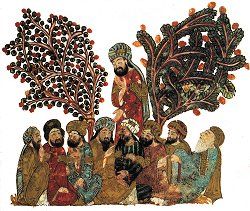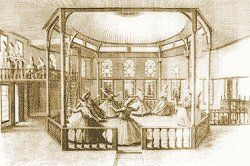Serving the Guest: A Sufi Cookbook
Essays | Recipes | Gallery
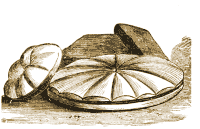
The Common Bond
Bread signifies all God given provisions, the abundance in simplicity, the Giver and gift of life in its continuous flow, first things in the day, essential priorities.
is content with a loaf of bread;
By its light he may be turned
towards the Light of God.
Aish, "life," is one ancient Arabic term for bread; accordingly, it is treated with reverence throughout the Muslim world. Before kneading dough, the baker blesses it with "Bismillah," and again before putting it in the oven. Mistreatment of bread is a sign of disrespect toward the Source of all sustenance. If a piece of bread is found on the ground, little time will pass before someone picks it up, kisses it, says "Bismillah," and sets it in a safe, clean place. In most homes bread is served at every meal, and is used to scoop up food; dunk into soup, stew or tea; or roll up with cheese, olives or herbs.
Mevlana describes a journey that begins with death and ends in Love:

is transformed into tall stalks of grain.
Crushed in the mill, its value increases and it becomes bread, invigorating to the soul.
Ground in the teeth, it becomes spirit, mind, and the understanding of reason;
Lost in Love, that spirit delights the sowers after the sowing.
Fermentation is the catalyst for dough's ultimate transformation — wheat dies and is brought to life by the breath of the yeast, as all creatures die and are brought to life by the grace and breath of God. This process of transformation of wheat into bread is a microcosm of the process of spiritual development in the Sufi tradition — inshallah, the death of concern with individual desires, resulting in the alignment of human will with Divine will, and the evolution of a human life into one well capable of consciously fulfilling its purpose of service to creation.
Salt is one of the most ancient preservatives, signifying incorruptibility, perpetuity, and purification; it is an emblem of the intention which gives significance to action.
This spiritual salt made Muhammad more refined than all others...
This salt survives in his heritage; his heirs are with you. Seek them!
it left behind its asininity and mortality.
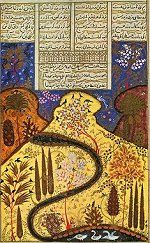
The symbolic significance of salt runs deep in the traditions of the People of the Book. The covenant between God and the Jews was a covenant of salt, ritually remembered with salt.
On the road from Galilee to Jerusalem, Jesus reprimanded his argumentative disciples, invoking the metaphor of salt:
Until recently, salt has been a precious commodity, rare and irreplaceable. Retrieved from the sea and from the depths of the earth, only a little is needed to transform and bring life to the flavor of food. No more than a little salt is needed to keep a living organism alive — and that little is absolutely necessary. Water constitutes close to 75% of the human body, salt less than 1%. That salt carries an electrical charge that maintains homeostasis, the fluid balance of the cells. Without it, water would flow through cell membranes uncontrolled, and they would burst.
This microcosm of cellular life reflects a subtler reality. All creatures are emanations of the creative power of God, the boundless ocean of Unity. The salt that we share with the earth — physical existence — gives rise to the compelling illusion of separation which the Sufi seeks to overcome, yet at the same time it is a gift, a mercy, and a creation of God. It is the boundary without which we cannot be whole in the physical world or in our human interactions.
to the two great bodies of water — the one sweet and thirst-allaying, and the other salty and bitter — and yet has wrought between them a barrier and a forbidding ban.
And He it is who out of this very water has created man...
Its waves are amazing. It's beautiful to be a sea
hidden within an infinite drop.
Together, Mother bread and Father salt encompass the work of civilization — sowing, harvesting, milling; leavening and baking of grain; seeking and gathering salt from the sea and earth; trade and commerce in salt. Together they symbolize effort, creativity, intelligence and wisdom, and the cooperation that is necessary to bring them to the table and to keep peace in the world.
Islamic traditions of the esoteric bonding power of bread and salt date back to the early days of the Qur'anic revelation. It is said that a shared mouthful of bread was the meal shared by disciples of Jesus, in answer to their prayer for a sign of God's acceptance of their faith.
Could thy Sustainer send down unto us a repast from heaven?"
Jesus answered: "Be conscious of God, if you are truly believers.!"
Said they: "We desire to partake thereof, so that our hearts might be set fully at rest, and that we might know that thou hast spoken the truth to us, and that we might be of those who bear witness thereto!"
Said Jesus, the son of Mary: "O God, our Sustainer! Send down upon us a repast from heaven: it shall be an ever-recurring feast for us — for the first and last of us
and a sign from Thee.
And provide us our sustenance, for Thou art the best of providers!"
The hadith al-luqma was a tradition in which the knowledge of God was transmitted by means of a mouthful of bread, passed from Hasan al-Basri through a line of early Sufis down to Mansur al-Hallaj:
At the second trial of Hallaj for heresy, testimony was offered that a piece of miraculously preserved bread found in a basket belonging to him was, in fact, the holy luqma of that tradition. It is said that Muinuddin Chishti received his initiation in the same manner.
Such traditions are a symbolic basis for the sacred regard given shared meals in the dervish orders, and for the reputation of bread as fundamentally consecrated food. They are echoed in the Mevlevi initiation rituals described by the 17th century traveler Evliya Efendi.
Evliya himself was blessed with a lokma when he was an infant.
Due to its consecrated nature, bread traditionally carries with it the blessing power of baraka, particularly when, as above, it is offered by one of exceptional spiritual merit. The traveler Ibn Jubair described a scene from 12th century Damascus:

Baraka can also be conveyed through bread, or any other food, that has been prepared in a sacred place.
Whenever Nizamuddin Auliya was asked for a token of baraka, he offered morsels of the bread baked in the kitchen of his khanqah; such bread came to acquire a phenomenal reputation. It is said that when Qazi Muhiyuddin Kashani was imprisoned, he sent the Shaikh a message asking him to pray for his release. The Shaikh sent him three loaves of bread, instructing him to eat one each day. On the third day, Muhiyuddin was released from the prison.
The sharing of bread and salt is a traditional basis of hospitality, a rite of friendship which nullifies antagonism and creates an indissoluble mutual obligation of protection.

I must preserve you from all danger.
In one of Mevlana's stories, Pharaoh invoked the bond of bread and salt to defend himself against Moses' painful criticism. In another story from the Mathnawi, a guest, surprised at a servant's anger toward him, asks:
Every hostility must have its cause; otherwise, our shared humanity would call for faithfulness in friendship.
Hujwiri, in his writings on adab, stated dervishes "should not eat alone[...] and should begin by saying 'Bismillah,' and should dip the first mouthful in salt." Turkish Sufis of the 14th and 15th centuries drank salted water as a ritual of initiation. The bond of salt established in the Mevlevi initiation was reaffirmed with each communal meal in the tekke, which began and ended with each dervish taking a taste of salt from a common dish. The Nimatullahi Order's adab of the sofreh (an eating cloth) requires that salt be the first thing placed on the sofreh, followed by bread, then the rest of the meal; the meal begins and ends with a bite of salt.
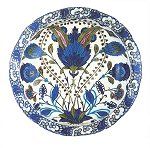
There is a large stone bowl at the head of the tomb of Ateshbaz-i-Veli, Mevlana Jalaluddin Rumi's personal cook. The bowl is filled with salt, and visitors to the tomb traditionally carry away a handful. Brought home to their own kitchens and tables, the salt is a sign of spiritual power and a reminder that human beings share spiritual and material substance and sustenance not only with their contemporaries, but with the companions and teachers who came before them.
from Serving the Guest: A Sufi Cookbook
Copyright © 1999, 2000 by Kathleen Seidel
Sources of previously published material by other authors used by permission, and print sources for images, may be found at http://www.superluminal.com/cookbook.
